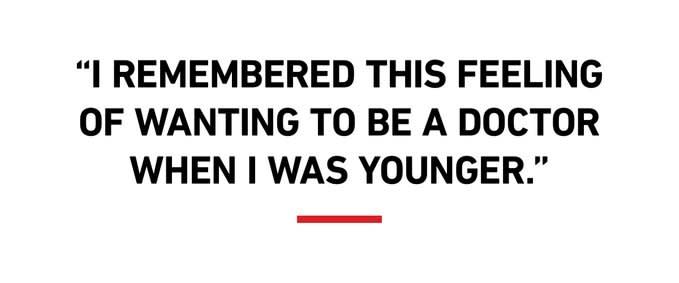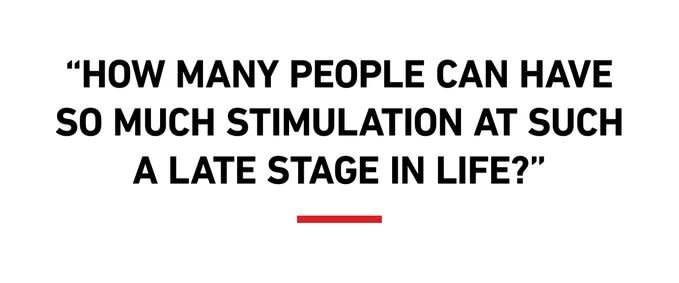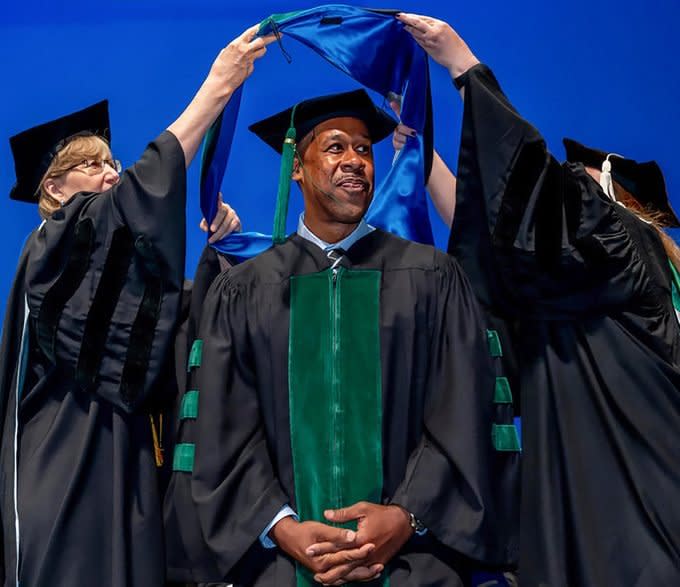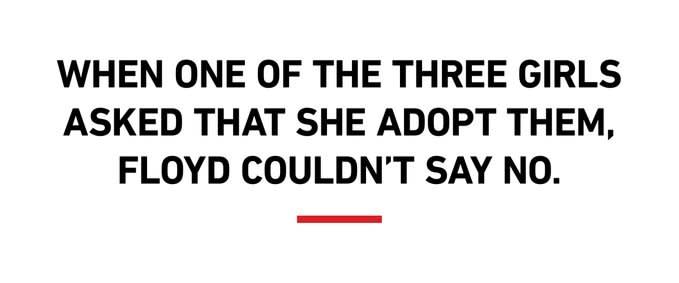Inspiring Stories from People Who Found Their True Calling Halfway Through Life
From Car Doc to People Doc
By Andy Simmons
Carl Allamby overcame self-doubt to realize his lifelong dream.
Carl Allamby had a problem. It was his auto-repair business. He’d started it at the tender age of 19, working alone out of a rented bay in a friend’s garage. Over the years it had grown into two shops with 11 employees, but Allamby had become antsy, yearning for something more. At first, he thought it must have to do with growing his business even further. So at the age of 34, the Beachwood, Ohio, resident decided to go for his bachelor’s degree in business management.
There was a wrinkle, however: After taking classes part-time over the next five years, Allamby was told he had to take biology to get his degree. The last biology class he had taken was in ninth grade. What do I need to take biology for, thought Allamby.

Turns out, it was the best thing that could have happened. Biology class rekindled a childhood dream that he had tucked away somewhere deep within himself. “After the first day, I remembered this feeling of wanting to be a doctor back when I was younger,” Allamby says. “I kind of lost that dream somewhere through high school and through life. When you’re young, you feel you can be anything, and then the world teaches you much differently.”
Born in East Cleveland, Ohio, Allamby and his five siblings were raised by their stay-at-home mother and a father who sold home goods door to door. “As you can imagine, that didn’t pay so well,” Allamby says.
Growing up in a poor African American neighborhood, he faced low expectations and numerous barriers to pursuing his dream. His school didn’t offer the advanced science classes that might have led him on a premed path. Even if it had, doing well in school could prove dangerous. “You could get into a lot of trouble just for being the class nerd,” Allamby says. “There were often times you wouldn’t carry your books home due to the threat of being jumped.” So he set aside thoughts of becoming a doctor in favor of a more realistic career path—fixing cars.

But a different Carl Allamby walked into that biology class at age 39. The world may have knocked him around once or twice, but it hadn’t flattened him. He was ready to live his dream. With the support of his wife and family, he decided to skip business school in favor of the science classes he’d need for a second career as a health-care worker. Becoming a doctor when he would be approaching the age of 50 seemed insane. He would instead become a nurse, a physician assistant, or a physical therapist like his wife, he reasoned.
But Allamby’s chemistry professor at Cleveland State University stopped him after class one day. “Carl,” he said, “you’re like the oldest guy here. What’s your end game?”
Allamby went through the spiel he’d developed about how he’d like to become a doctor but it would be more practical to aim lower.
“Why not a doctor?” the professor asked. “You have a great intuition for the work. You will go a long way.”
He was right. Allamby aced all his courses. “It took someone standing on the outside to tell me what I didn’t even see in myself,” he says.
And so in 2015, Allamby cut ties with his past. He auctioned off his two shops and everything that was in them. “I sold my whole life in a matter of hours,” he says. “It was liberating.” Then he started at Northeast Ohio Medical University.

In 2019, at the age of 47, Carl Allamby became Carl Allamby, MD. He took a job in emergency medicine at Cleveland Clinic Akron General. Now that Allamby is a second-year resident, his fellow residents never let him forget that he is the old man in the room. “Some of my jokes from the ’80s don’t go over so well,” he says, laughing.
It’s a small price to pay for the life he now gets to lead. “How many people can do something so brand-new and have so much stimulation and responsibility at such a late stage in their life?” he says. “My kids look up to me, my community looks up to me. I fit so many demographics that say you shouldn’t be a doctor. Whether it’s because of my age, my race, my upbringing, my past career—these are all good reasons why I shouldn’t be here. And yet, here I am.”
The Family That Grew from Grief
By Emily Goodman
Bobbie Floyd (center, in pink) surrounded by her eight children.
On October 19, 2016, 41-year-old Bobbie Floyd went to Penn’s Landing in Philadelphia and released dozens of balloons. The occasion was more somber than celebratory; she was honoring her late husband on the two-year anniversary of his death. As she and her two sons, ages 8 and 13, watched the colorful balls float up to the heavens, they thought of the missing member of their family and of the motorcycle accident that had taken him away from them.
Later that same day, Floyd’s phone rang. It was a social worker asking whether she’d be willing to foster two sisters, ages 7 and 11. Floyd and her husband had talked about adding to their family, a dream she had initially thought had gone with him. But about a year later, she had reconsidered and signed up to become a foster mother. “I was lonely,” she says. “And fostering is not adopting. That was my mentality. I’m just fostering these kids, loving them and then giving them back.” And now, at last, the call had come.
Floyd was happy to take in both girls, but when she opened her door to greet them, there were three children, not two. The girls’ brother, Lysander, 9, also needed a foster family. Floyd agreed to take him in as well. Siblings often get separated in the foster care system, and she wanted to prevent that, even if she had only three bedrooms.

Per her fostering agreement, Floyd took the kids every three months to family court in case their biological parents were ready to take them back. Each time, the judge extended the foster agreement for another three months. Meanwhile, the longer the kids stayed with Floyd, the more they grew to trust her. “They wrote notes saying that they wanted to stay here,” she says. Months turned into a year. When Floyd learned that “her” three kids had three more siblings (a sister and two brothers) in the foster system, she decided to make room for them. “We started adding bunk beds and making lofts,” she says. For some of the siblings, Floyd’s house was their ninth foster home. “I just kept seeing this family getting tossed around in the system,” she says. “So I figured, why not take them all?” When Serenity, one of the three girls, asked that she officially adopt them, Floyd couldn’t say no. Her two biological sons were on board.
Last year, the adoption became official for four of the six kids, and it’s almost complete for the other two. Then Floyd will be the mother of eight, ages 5, 6, 9, 11, 12, 13, 15, and 17. “We’re like a well-oiled machine,” she says. “In the kitchen, we’re sliding and grooving. We glide in and out of bathrooms. We make it work.”
Just a few years ago, Floyd was a lonely widowed mother of two. She can’t help but think that her late husband had a hand in her life’s transformation, especially since the phone call from the social worker came on the anniversary of his death. “I feel like he was saying, ‘Here, take these kids. Get busy. Stop crying.’ And I was busy, but I was still crying. Then he was like, ‘Here’s three more kids. Take them.’ Now I have no time to cry, so I just laugh and play and yell all day. Then I wake up and do it again.”
Readers Share Their Second-Act Stories
I’m with the band now
My 50th birthday made me stop and examine my life. With no great accomplishments behind me other than raising a wonderful son and showing up for work each day, I needed a new life adventure, one that would be creative and bring me joy. So I told my husband I was going to start a rock band. I got a bass guitar and, after some lessons, advertised for other musicians to join me. Nineteen years later, our band, Friends in Sound, still performs in venues all over New York City. My band has made my life complete. —Nancy Lenart, New York, New York
I confronted my addiction
My wife and I are in our second marriage—with each other. On Friday, September 29, 2017, I came home from work to discover that my wife had left me. I never saw it coming. As I would soon realize, I was the problem in our marriage. That acknowledgment was my first step toward admitting I had an Internet pornography addiction. If I wanted to save our relationship, I pretty much had to change everything about myself. The first step was to seek counseling.
Today, I have over three years of being porn-free. My wife and I were reunited after a two-month separation, but there was still a long road of reparations ahead. Our first marriage had to be burned down to the foundation. There are no more lies or secrets between us, just the bold, honest truth, even if it hurts. Our second marriage is characterized by an incredible intimacy that did not exist before. —James Devine, Glendale, Arizona
The children made me an author
In my 20s, I moved into a trailer park after fleeing an abusive, childless marriage. As I cleaned my trailer and spruced up the landscape, children kept stopping by, curious about the newcomer. They clearly craved attention, not to mention shoes, warm clothes, and reading material. I couldn’t fulfill all their needs, but I did buy an old bookcase and some used children’s books and set up a lending library in my home. On cold afternoons, kids stopped by for homemade bread and glasses of milk, which they enjoyed while coloring, reading books, and asking questions about school, God, prison—things that had an impact on their daily lives.
Those precious days helped my heart heal and allowed me to eventually find love without abuse and have children of my own. In January 2021, my ninth novel, Night Bird Calling, was released from Tyndale House Publishers. It’s about a woman who runs away from an abusive marriage and responds to an 11-year-old girl’s plea to open a community library in her new home. Gee, I wonder how I came up with that idea. —Cathy Gohlke, Leesburg, Virginia
My second act was a lifesaver
How many people can say that their second chapter literally saved their life? After 20 years in the health-care field, I left the corporate world to become a special education teacher. At the required physical, the doctor mentioned that I had a lump on my thyroid. That led me to a surgeon who, upon examining me, noticed a birthmark on my neck that concerned him. Although I’d had it since childhood, he decided that it needed to be removed. The birthmark turned out to be a malignant melanoma. This is my 15th year teaching, and every day I am grateful for my second act. —Stacey Zegas, Lawrenceville, New Jersey
Goodbye to bad choices
My first act was a tragedy. In my youth, teachers, peers, and family would describe me as intelligent and kind. Unfortunately, I had a knack for making poor decisions, resulting in my being arrested for robbery at 17. Four years later, I was released, only to be arrested for robbery again when I was 22. This time, I was sentenced to 11 years. It took me a few years behind bars, but at age 26, I realized what I had lost—time with my loved ones—and I regretted the pain I’d caused them. I needed to change. Fortunately, I still had an insatiable hunger for knowledge. I became certified in asbestos abatement, learned the basics of working in a machine shop, and enrolled in college through the Cornell University Education Program. Today, I live to learn. I’m still incarcerated, but, at 30, I’ve developed a mind-set that will not allow me to fail myself or the people I love. —Jon Nikiteas, Rochester, New York
Things I Wish I Could Tell My Younger Self
Stories That Prove It's Never Too Late to Change Your Life
Heartwarming True Stories That Will Restore Your Faith in Humanity
The post Inspiring Stories from People Who Found Their True Calling Halfway Through Life appeared first on Reader's Digest.



